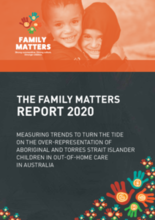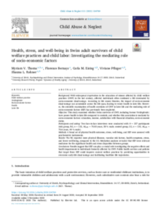Displaying 81 - 90 of 505
The overrepresentation of black children in the foster care population represents massive state supervision and dissolution of families concentrated in their neighborhoods. This chapter from Racial Disproportionality and Disparities in the Child Welfare System addresses the social impact of this concentration of child welfare agency involvement on the residents who live in these neighborhoods.
This chapter from Racial Disproportionality and Disparities in the Child Welfare System explores the factors contributing to the disproportionate number of Black children and families in the U.S. child welfare system.
Eurochild, in partnership with its national members hosted a webinar series to bring a children’s rights perspective to Europe’s recovery. Questions addressed: What is an ‘economy of well-being’ & why & how does it prioritise children? Why is tackling child poverty a pre-requisite to sustainably exit the crisis? Why and how does protecting children’s rights strengthen our democracies?
This paper documents the alignment between the circumstances created by anti-Black racism at institutional, provincial, and federal levels and the seemingly race-neutral eligibility criteria embedded within Ontario child welfare, which results in disproportionate reporting of Black families.
This webinar was part of Eurochild’s breakfast webinars to mark World Children’s Day 2020. The webinar looked at how the European Child Guarantee initiative can help address the growing challenge of child poverty, particularly the deepened economic divides that have resulted from the COVID-19 pandemic, and brought the perspective of the Spanish government, which has made the fight against child poverty a particular priority.
This webinar was part of Eurochild's breakfast webinars to mark World Children’s Day 2020. Focusing on the economic arguments for investing in children, this webinar also highlighted Finland’s efforts to prioritise children’s rights and why this makes economic sense.
Family Matters reports focus on what governments are doing to turn the tide on over-representation of Aboriginal and Torres Strait Islander children in out-of-home care and the outcomes for children. They also highlight Aboriginal and Torres Strait Islander-led solutions and call on governments to support and invest in the strengths of Aboriginal and Torres Strait Islander peoples to lead on child wellbeing, development and safety responses for our children.
This paper examines the ways in which anti-oppression and anti-racism perspectives can be included as an aspect of Child and Youth Care (CYC) thought and practice, with particular relevance to service provision for African Canadian families.
This study, a systematic review, examines various forms of housing problems and their relationship to different types of child welfare involvement.
This study examined whether Swiss survivors of child welfare practices (CWP), including former Verdingkinder, have poorer health in later life compared to controls, and whether this association is mediated by socio-economic factors: education, income, satisfaction with financial situation, socio-economic status.


